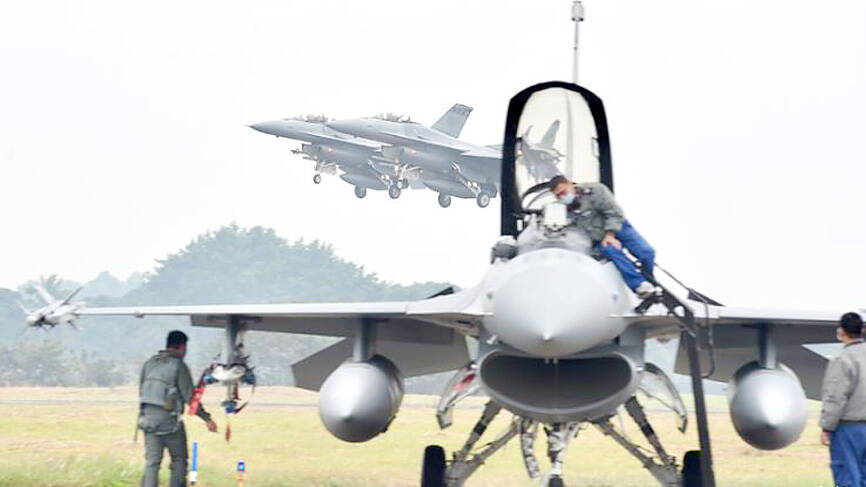The Ministry of National Defense (MND) has signed two deals worth NT$12.84 billion (US$419.31 million) with the US for parts and aviation materials to maintain Taiwan’s fighter jet fleet.
The ministry signed the agreements with the American Institute in Taiwan — NT$9.9 billion for spare parts and NT$2.94 billion for nonstandard parts and aviation materials — it said in a public contract notice on Friday.
The spare parts contract is to be implemented from this month to March 2028, while the smaller agreement also starts from this month through June 2027, it said.

Photo: Taipei Times file photo
The air force is under immense strain to maintain jets as it is flying numerous missions in response to China’s constant military incursions into the nation’s air defense identification zone (ADIZ), a defense official said on condition of anonymity.
Fighters have been scrambled to shadow Chinese jets and large uncrewed aerial vehicles, while also conducting other missions, including reconnaissance flights by RF-16s, they said.
The missions haven taken a heavy toll on Taiwanese aircraft and led to a significant increase in demand for parts and materials, they said, adding that the navy has also been obliged to deploy warships to monitor Chinese military vessels.
The military has already exhausted its budget for jet and ship fuel because of attempts to counter Beijing’s activities, the official said, adding that the Executive Yuan released NT$1.68 billion from its reserve funds for fuel.
The military from early Thursday to early yesterday detected 19 aircraft sorties, including 10 that crossed the median line of the Taiwan Strait or entered the country’s southwestern ADIZ, in addition to five naval sorties in waters around Taiwan, the ministry said.
In other news, members of the legislature’s Foreign Affairs and National Defense Committee are on Thursday to tour a facility of CSBC Corp, Taiwan (台灣國際造船), the company contracted to build a prototype of an indigenous submarine.
The visit was listed in the legislators’ public schedules, although the purpose of the tour was classified.
The prototype submarine utilizes a partial double-hull design consisting of six pressurized compartments and a conning tower, with an X-shaped tail rudder and stabilizing fins on the sides of the tower, CBSC said.
The 70m-long submarine is to carry 18 MK-48 torpedoes and an undisclosed number of ship-launched Harpoon missiles. It is to have a displacement of 2,500 to 3,000 tonnes.
CSBC is in the process of completing the submarine’s pressure hull and said it expects to launch the vessel in September.
Last month, the defense ministry invited professors and students of engineering to attend a presentation on the making of the prototype and tour CSBC’s submarine factory in Keelung’s Jhongjheng District (中正).
CSBC used computer models to simulate the submarine’s assembly and a mock-up of the vessel has been built to train maintenance personnel, an attendee of the tour said in an article published anonymously on the Chinese-language online news outlet Up Media.
The factory at that time was working on the bow torpedo tubes, which is the most critical step in manufacturing the pressure hull, the person said.
The use of a large five-axis computer numerical control machine showed that crews were paying careful attention to reducing the vessel’s weight, they added.

TRUST: The KMT said it respected the US’ timing and considerations, and hoped it would continue to honor its commitments to helping Taiwan bolster its defenses and deterrence US President Donald Trump is delaying a multibillion-dollar arms sale to Taiwan to ensure his visit to Beijing is successful, a New York Times report said. The weapons sales package has stalled in the US Department of State, the report said, citing US officials it did not identify. The White House has told agencies not to push forward ahead of Trump’s meeting with Chinese President Xi Jinping (習近平), it said. The two last month held a phone call to discuss trade and geopolitical flashpoints ahead of the summit. Xi raised the Taiwan issue and urged the US to handle arms sales to

A magnitude 5.6 earthquake struck off the coast of Yilan County at 12:37pm today, with clear shaking felt across much of northern Taiwan. There were no immediate reports of damage. The epicenter of the quake was 16.9km east-southeast of Yilan County Hall offshore at a depth of 66.8km, Central Weather Administration (CWA) data showed. The maximum intensity registered at a 4 in Yilan County’s Nanao Township (南澳) on Taiwan’s seven-tier scale. Other parts of Yilan, as well as certain areas of Hualien County, Taipei, New Taipei City, Taoyuan, Hsinchu County, Taichung and Miaoli County, recorded intensities of 3. Residents of Yilan County and Taipei received

Taiwan has secured another breakthrough in fruit exports, with jujubes, dragon fruit and lychees approved for shipment to the EU, the Ministry of Agriculture said yesterday. The Animal and Plant Health Inspection Agency on Thursday received formal notification of the approval from the EU, the ministry said, adding that the decision was expected to expand Taiwanese fruit producers’ access to high-end European markets. Taiwan exported 126 tonnes of lychees last year, valued at US$1.48 million, with Japan accounting for 102 tonnes. Other export destinations included New Zealand, Hong Kong, the US and Australia, ministry data showed. Jujube exports totaled 103 tonnes, valued at

BIG SPENDERS: Foreign investors bought the most Taiwan equities since 2005, signaling confidence that an AI boom would continue to benefit chipmakers Taiwan Semiconductor Manufacturing Co’s (TSMC, 台積電) market capitalization swelled to US$2 trillion for the first time following a 4.25 percent rally in its American depositary receipts (ADR) overnight, putting the world’s biggest contract chipmaker sixth on the list of the world’s biggest companies by market capitalization, just behind Amazon.com Inc. The site CompaniesMarketcap.com ranked TSMC ahead of Saudi Aramco and Meta Platforms Inc. The Taiwanese company’s ADRs on Tuesday surged to US$385.75 on the New York Stock Exchange, as strong demand for artificial intelligence (AI) applications led to chip supply constraints and boost revenue growth to record-breaking levels. Each TSMC ADR represents